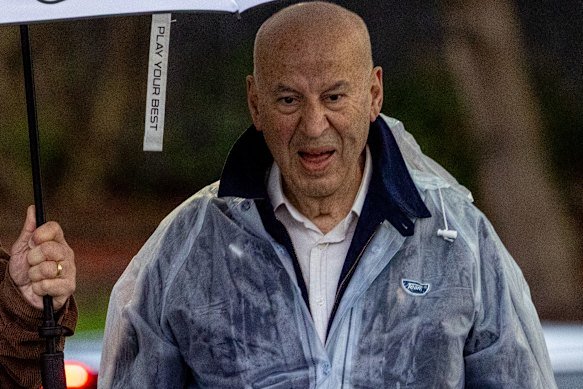Disgraced former NSW Labor minister Eddie Obeid was released from prison on Wednesday morning after serving a sentence of three years and ten months for his role in a conspiracy that generated a $30 million windfall for his family from a crooked coal deal.
The 81-year-old, once one of the most powerful and feared figures in state politics, walked free from the Long Bay Correctional Complex, but his legal troubles are far from over, with another criminal trial scheduled for next year and renewed political scrutiny over the unrecovered profits from his corruption.
Mr. Obeid was released from the prison’s aged care facility shortly after 7 am, carrying his belongings in plastic bags before entering a waiting vehicle. He was later seen arriving at his wife’s home in the northern Sydney suburb of Lindfield, where he was met by a large gathering of his extended family.
His release marks the latest chapter in one of Australia’s most significant political corruption sagas, which has spanned more than two decades and multiple inquiries by the state’s anti-corruption watchdog.

The Crime That Jailed a Powerbroker
Mr. Obeid’s most recent prison term was for a 2021 conviction of conspiring to commit misconduct in public office. The case centred on a coal exploration licence granted over the Obeid family’s rural property, Cherrydale Park, in the Bylong Valley.
A landmark inquiry by the Independent Commission Against Corruption (ICAC) found that in 2008, then-Resources Minister Ian Macdonald, a political ally of Mr. Obeid, created a mining tenement specifically over the Obeid farm, providing the family with crucial inside information.
Using this confidential knowledge, the Obeid family negotiated with mining companies and orchestrated deals that ultimately led to a $30 million profit when the exploration licence was granted. Mr. Obeid’s son, Moses Obeid, was also convicted for his role in the conspiracy and was released from jail in October 2024, though he subsequently served a period of home detention for a separate charge. Mr. Macdonald, 76, remains in prison and will not be eligible for parole until January 2027.
A History of Corruption Findings
The
Mount Penny coal conspiracy was just one of seven ICAC inquiries that focused on Eddie Obeid’s conduct as a public official. His long history of evading accountability began to unravel more than a decade ago. In June 2014, the ICAC handed down three separate damning reports that found Mr. Obeid had acted corruptly in relation to secret family interests in cafe leases at Circular Quay, undisclosed stakes in a health company, and the granting of water licences that benefited his family farm. It was his lobbying over the cafe leases that resulted in his first prison sentence; in December 2016, he was jailed for a maximum of five years for that offence.
Despite the repeated findings, Mr. Obeid remained publicly defiant, famously telling journalists in 2014, “Personally, I don’t give a damn.” His legal troubles are set to continue, with another criminal trial scheduled for next year stemming from yet another ICAC investigation into the Obeid family’s secret shareholding in the infrastructure company Australian Water Holdings (AWH).
Scrutiny Over Unrecovered Profits
While Mr. Obeid has now served his time for the coal conspiracy, the $30 million profit it generated for his family has never been recovered by the state. Earlier this year, NSW Crime Commissioner Michael Barnes described the prospect of confiscating the funds as “not feasible” under current laws, a situation that has caused significant public and political frustration.
On the day of Mr. Obeid’s release, NSW Premier Chris Minns confirmed that his government would introduce legislative changes to prevent such an outcome in the future. Speaking at a budget estimates hearing, Mr. Minns said the law was “ripe for change” and that the new legislation would address the “evidentiary burden” imposed on the Crime Commission in its efforts to recover criminal assets.
Separately, the Australian Taxation Office has been engaged in an 11-year battle to pursue members of the Obeid family for their failure to pay tax on the proceeds of the coal deal, further highlighting the difficulty authorities have faced in clawing back the ill-gotten gains from one of the state’s most notorious corruption scandals.

